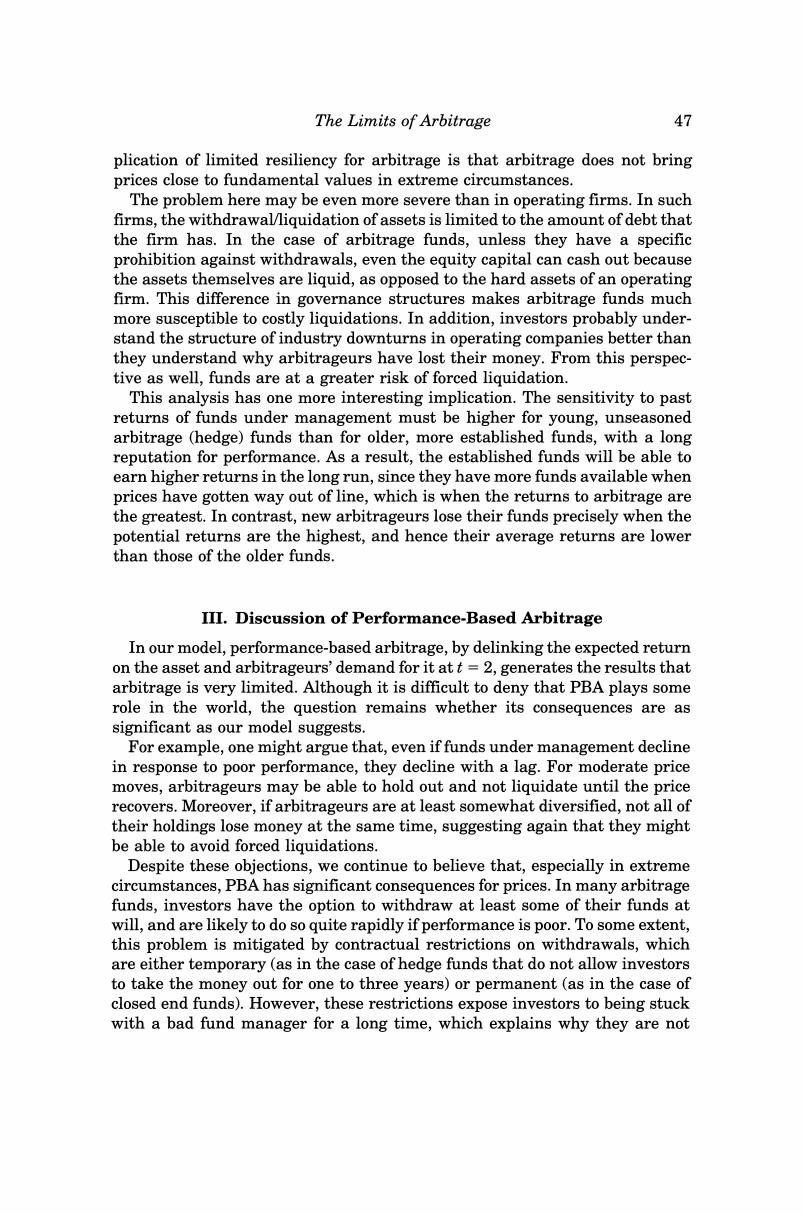正在加载图片...

The Limits of Arbitrage 47 plication of limited resiliency for arbitrage is that arbitrage does not bring prices close to fundamental values in extreme circumstances. The problem here may be even more severe than in operating firms.In such firms,the withdrawal/liquidation of assets is limited to the amount of debt that the firm has.In the case of arbitrage funds,unless they have a specific prohibition against withdrawals,even the equity capital can cash out because the assets themselves are liquid,as opposed to the hard assets of an operating firm.This difference in governance structures makes arbitrage funds much more susceptible to costly liquidations.In addition,investors probably under- stand the structure of industry downturns in operating companies better than they understand why arbitrageurs have lost their money.From this perspec- tive as well,funds are at a greater risk of forced liquidation. This analysis has one more interesting implication.The sensitivity to past returns of funds under management must be higher for young,unseasoned arbitrage (hedge)funds than for older,more established funds,with a long reputation for performance.As a result,the established funds will be able to earn higher returns in the long run,since they have more funds available when prices have gotten way out of line,which is when the returns to arbitrage are the greatest.In contrast,new arbitrageurs lose their funds precisely when the potential returns are the highest,and hence their average returns are lower than those of the older funds. III.Discussion of Performance-Based Arbitrage In our model,performance-based arbitrage,by delinking the expected return on the asset and arbitrageurs'demand for it at t=2,generates the results that arbitrage is very limited.Although it is difficult to deny that PBA plays some role in the world,the question remains whether its consequences are as significant as our model suggests. For example,one might argue that,even if funds under management decline in response to poor performance,they decline with a lag.For moderate price moves,arbitrageurs may be able to hold out and not liquidate until the price recovers.Moreover,if arbitrageurs are at least somewhat diversified,not all of their holdings lose money at the same time,suggesting again that they might be able to avoid forced liquidations. Despite these objections,we continue to believe that,especially in extreme circumstances,PBA has significant consequences for prices.In many arbitrage funds,investors have the option to withdraw at least some of their funds at will,and are likely to do so quite rapidly if performance is poor.To some extent, this problem is mitigated by contractual restrictions on withdrawals,which are either temporary (as in the case of hedge funds that do not allow investors to take the money out for one to three years)or permanent(as in the case of closed end funds).However,these restrictions expose investors to being stuck with a bad fund manager for a long time,which explains why they are not